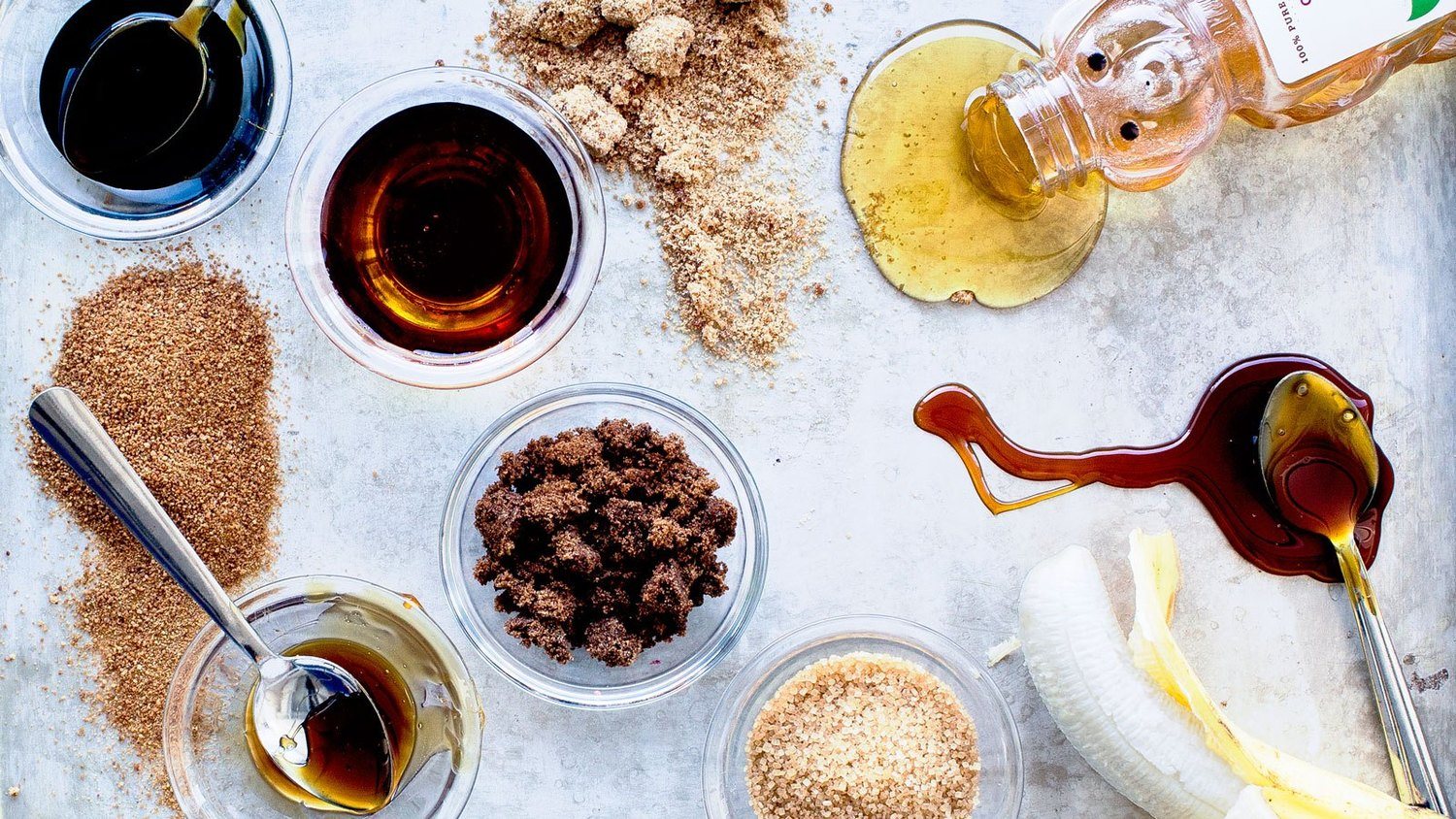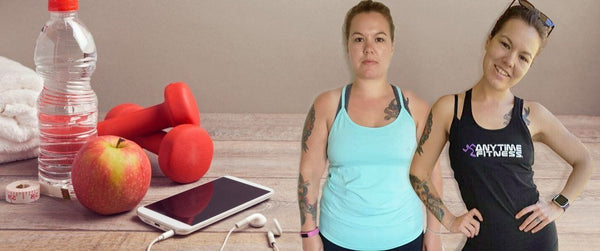
The facts about rice malt syrup and 8 other sugar alternatives
You will have probably read, seen and heard many so called nutrition experts advising you to avoid using white sugar and instead use rice malt syrup, or other sugar alternatives in your cooking. There's so much misinformation out there on this topic I thought it was time someone came clean with you about the facts about sugar alternatives.
"Sugar alternatives" are a sugar which is a sugar
For most people, it doesn't matter if a particular sugar alternative is made from glucose, also known as dextrose, or from fructose, sucrose, maltose, lactose or galactose. You may noticed a common theme with those words… all of those types of sugars all end in "-ose". There's a very good chance any ingredients you see ending in "ose" are sugars.
Are all sugars equal?
No. All sugars are not equal.
Are all sugars, pretty much equal?
Yes. Whilst they're not absolutely identical in chemical structure or in the way your digestive system processes them, all sugars you'll find in your food are pretty much the same. Your body converts these simple carbohydrates into glucose (very quickly).
The only noticeably different sugar is glucose , this is already in the form that your body uses it so it doesn't need to get broken down or processed at all, it enters your blood stream and boosts your blood glucose levels almost immediately.
Your body is amazingly powerful and it doesn't really care if you're giving it any of the -ose's. It will, very quickly, turn any of these -ose's into the glucose which it needs.
Is honey a sugar?
Unfortunately so. Honey contains almost equal amounts of glucose and fructose – both sugars. If you look at the nutrition table you'll see per 100g, honey has about 81g of sugar. The rest is made up of water, ash and some other trace elements. You can read more about honey below.
But what about the vitamins, minerals and other goodness?
Sorry to break it to you, but unless you're eating it by the jarful (don't do this), the amounts of vitamins and minerals found in sugar alternatives are insignificant compared to what you get from actually eating fresh fruits and vegetables, nuts, seeds, meats and dairy.
Let's look at the 9 most common sugar alternatives
 |
1. Rice Malt SyrupMade popular by someone who quit sugar, this sugar alternative is often stated to be made from Brown Rice – fantastic right, brown rice is healthy? Well yes, brown rice is healthy, but by the time it's been boiled down and treated, there's not a great deal of nutritional value left in it. The sugar in Rice Malt Syrup is made up of mostly Maltose and Maltoriose.
The verdict: Avoid it if you can, there are better sugar alternatives. |
||||||||||
 |
2. Agave SyrupOften found in hipster cafe's, agave syrup (sometimes misleadingly referred to as agave nectar) is made from the agave plant native to Mexico. Agave are big spiky plants from the same family as Aloe vera. Popular with vegans as there's no bees involved in the process (except for pollination of the plant, but the bees love doing that), agave syrup is very high in fructose but astonishingly has a really low glycemic index (GI). The sugar in Agave Syrup is made up of Fructose (75%) and Glucose (25%).
The verdict: A nice rich flavour. Whilst it has a low GI, it's still sugar so use this sugar alternative sparingly. |
||||||||||
 |
3. Coconut Sugar / Coconut SyrupThe favourite ingredient of 2016 has been used for everything from cooking, frying, drinking and even body scrubs! So how does coconut sugar stack up? Despite sounding delicious, it is no different, or better for you than regular cane sugar – sorry! The sugar in Coconut Sugar is made up of mostly Sucrose and small amounts of Fructose and Glucose.
The verdict: Tasty but expensive and not much better for you than regular table sugar. Don't be caught out by this fad sugar alternative. |
||||||||||
 |
4. High Fructose Corn Syrup (HFCS)Confusingly named as it's not really that much higher in fructose than regular corn syrup… This ingredient is the US soft drink industry favourite. It's cheap to make and works well in industrial food and drink production processes. HFCS is rarely used in Australia. Is it more evil than other sugars? Not really. Just check ingredient labels and be aware of how much of any added sugar you have in your diet. The sugar in High Fructose Corn Syrup is made up of equal parts of Fructose and Glucose, and small amounts of other sugars.
The verdict: Avoid it as much as you would any other added sugar. It's no saint, but it's not evil either, it's just sugar. |
||||||||||
 |
5. Evaporated Cane JuiceThe Australian equivalent of HFCS. Sometimes called "evaporated cane juice" by food manufacturers trying to trick you, don't be fooled by the word juice, this is just straight up cane sugar. You'll see cane sugar used in everything from cakes, to juices, soft drinks and tinned foods. Most added sugar in Australia is cane sugar. Why? Because we produce so much of it! Take 2 seconds and look at the back of pack before putting those items in the trolley. Even things like pasta sauce will often have cane sugar or other sugars added. Your body does not need added sugar. Cane Sugar is the most common form of sugar in Australia. It's made up of 99.9% Sucrose.
The verdict: Check the packet! Don't be fooled by food manufacturers into thinking "evaporated cane juice" is somehow anything other than sugar. |
||||||||||
 |
6. DatesThe little nuggets of sweetness are no doubt delicious, but dates are still very high in sugar. Dates, a fruit of the palm tree and traditionally popular in middle eastern cooking have made their way to the west and are now found in many foods as a natural sugar alternative. Don't get me wrong, dates are a great little snack if you feel like something sweet, we even use them in our Date & Walnut Loaf, but don't start tucking in by the handful as these guys do pack a fair amount of sugar. The sugars in dates is made up of almost equal portions of Fructose and Glucose.
The verdict: Delicious as a small snack but at 2/3rds sugar, don't forget to consume them in moderation as you would any other sugar or sugar alternative. |
||||||||||
 |
7. Maple SyrupSorry Canada. (We still love you ?? ? ) Despite being super delicious, Maple Syrup as a sugar alternative is not going to do you any favours, it's still mostly sugar. If you're having a small amount of Maple Syrup because you love the flavour then go for it, but don't kid yourself that's its any better than any other sugar alternative. Love Maple, hate the sugar? Canadians and Maple Purists alike (it's a thing) will hate me when I say this, but if you want the maple flavour without the sugars, there are some really good Sugar Free Maple Flavoured Syrups out there. The two that spring to mind are from Queen, and Walden Farms. These use sugar alcohols instead of sugars. The sugar in Real Maple Syrup is mostly Sucrose with very small amounts of Glucose and Fructose.
The verdict: Enjoy if you enjoy the flavour, but don't swap it thinking you're being healthy. |
||||||||||
 |
8. HoneyThe beautiful syrup created by our favourite little friends, the humble bee. As we touched on earlier, honey is often swapped in place of table sugar which is fine – it has a beautiful flavour, but sorry to say, it is super high in sugar. Regular supermarket varieties of honey have a GI similar to white sugar with some varieties such as Yellow box or Ironwood having slightly lower GI's. The sugars in honey is made up of almost equal portions of Fructose and Glucose.
The verdict: Great on toast with butter, it's natural and usually minimally refined, but from a nutrition perspective, it's not too dissimilar to eating normal white sugar. |
||||||||||
 |
9. Barley Malt SyrupSimilar to Rice Malt Syrup, this sugar alternative is very alternative, but also very high in sugar. Barley Malt Syrup is made from barley grains soaked in water and left to spout. It's this sprouting process that turns starches into sugars which the plant would normally then use to grow. Once the barley grains have been sprouted, the grains are mixes with more water, boiled and blended until consistent texture and the boiled down to remove excess water. So how does it compare as a sugar alternative? Well, it's lower GI than regular sugar at just 42, however in composition it's about 75% maltose with the rest being made up of glucose and traces of fructose and sucrose. The sugars in Barley Malt Syrup are made up of mainly Maltose.
The verdict: Adds a great rich flavour when used in cooking, but use sparingly as with any other sugar alternative. |
They all seem pretty bad, are there any "healthy" sugars or sugar alternatives? I have a sweet tooth!
Eat Fresh Fruit (NOT Juice)
If you have a hankering for something sweet, then tuck into a piece of fresh fruit. But make sure that you're eating the whole thing so you're also getting the fibre and the other nutrients.
We're blessed in this country with great fruit and vegetables so enjoy them. If you need to keep your natural sugars down for dietary requirements or preferences, then opt for berries instead which are naturally low carb and packed full of other good stuff too.
Sugar Alcohols
Sugar alcohols can be a great alternative to white sugar or other high sugar syrups. As the name suggests, sugar alcohols are a mix of sugar and alcohol molecules, whilst they won't get you drunk as they don't contain any ethanol, they do still have a caloric value which you need to take into account.
Many sugar alcohols occur naturally in fruits and vegetables and because they have a very similar structure to sugar molecules, they activate the sweet receptors on your tongue but don't follow through with the huge caloric value that actual sugar contains.
We'll go into more detail about sugar alcohols another time if you'd like to read more about them now, check out this great article by Healthline team which explains the different types and where they come from.
The verdict?
As I said at the start of this article, a sugar is a sugar is a sugar. Yes some of them slightly "better" than others, but that's to be expected – nothing in nature is exactly equal.
Don't fall for claims that some sugars are better because they have vitamins or minerals. To get a beneficial amount of those vitamins or minerals you'd have to be consuming a stupid amount which would end up causing much bigger health issues.
See for yourself!
Head over to our product page. Every one of our ingredients is clearly labelled, we use no sugar alternatives and only use natural sweeteners. No hidden Rice Malt Syrup in sight!
Further Reading:
You're addicted to sugar and you don't even know it. Take the quiz
- https://foodwatch.com.au/reviews/item/product-snapshot-rice-malt-syrup.html
- https://foodwatch.com.au/blog/carbs-sugars-and-fibres/item/agave-is-it-better-than-sugar.html
- https://foodwatch.com.au/blog/carbs-sugars-and-fibres/item/coconut-sugar.html
- https://ajcn.nutrition.org/content/88/6/1716S.full
- https://en.wikipedia.org/wiki/Sugarcane
- https://en.wikipedia.org/wiki/Date_palm#Dates
- https://foodwatch.com.au/blog/carbs-sugars-and-fibres/item/are-syrups-better-for-you-than-sugar.html
- https://en.wikipedia.org/wiki/Barley_malt_syrup


